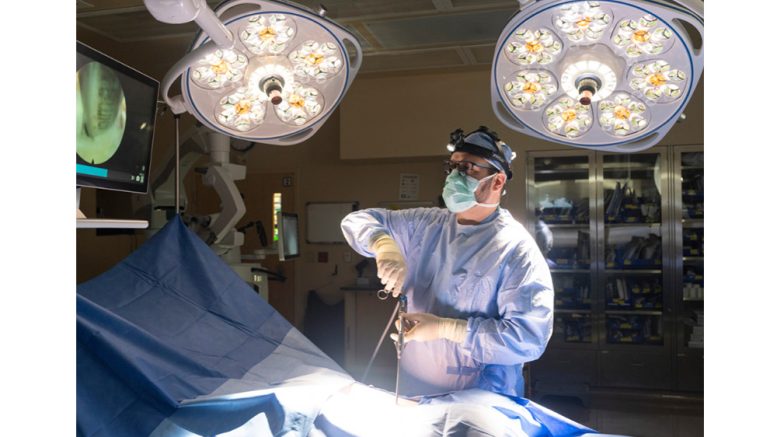Submitted
For the second year in a row, OrthoIndy leads central Indiana in endoscopic spine surgery – a cutting-edge, ultra-minimally invasive procedure that offers faster recovery, less post-operative pain and improved outcomes for patients with back pain or spine conditions.
Dr. M. Craig McMains, who launched OrthoIndy’s comprehensive endoscopic spine program in late 2023, has already performed 30 procedures in 2025 and is on pace to exceed the number he completed in the program’s first year, which was approximately 50. He remains the only surgeon in central Indiana trained to treat various spinal conditions using endoscopic techniques.
The basics & benefits of endoscopic spine surgery
Endoscopic spine surgery uses a tiny incision as small as five millimeters – roughly the width of a No. 2 pencil – to insert a small tube equipped with an endoscope and high-definition camera. This minimally invasive approach contrasts with traditional open spine surgery, which typically requires an incision at least 10 times larger – at five centimeters – and involves cutting through muscles and soft tissue. During endoscopic spine surgery, surgeons use specialized instruments to perform precise repairs while minimizing disruption to the surrounding area.
In addition to faster recovery times and less post-operative pain, benefits of endoscopic spine surgery include less blood loss, a reduced infection rate and a better chance of maintaining flexibility than traditional open surgery. Patients who have had the procedure at OrthoIndy also report that its muscle-sparing benefits were evident in their post-op MRIs.
“It is the least invasive way to perform spine surgery,” Dr. McMains said. “Our patients appreciate that their incisions are smaller and that they can get back to their daily lives more quickly. It’s especially beneficial for those who’ve tried other treatments without success and those seeking alternatives to open surgery.”
Expanding eligibility for endoscopic spine surgery
Recent advances are making endoscopic spine surgery an effective treatment for an expanding range of spine conditions. You may be eligible for the procedure if you are experiencing herniated discs, spinal stenosis, facet joint syndrome, bone spurs, spinal joint arthritis, slipped vertebra, or failed back surgery syndrome.
Dr. McMains uses endoscopic techniques for fusion surgery alternatives, decompression of nerve roots, and even more complex procedures such as spinal fusions. He also uses the technique to treat paraspinal defects, or pars defects, and fractures.
“These are problems that used to mean open surgery, long recoveries or bracing that didn’t always work,” Dr. McMains said. “Now, I can treat them endoscopically – with less risk and faster recovery.”
Expanding training & access to endoscopic spine surgery
Dr. McMains is one of a small but growing number of surgeons nationwide – and the only one in the greater Indianapolis area – trained to perform the complete range of endoscopic spine techniques. He’s dedicated to expanding patient access by sharing his expertise and training other surgeons across Indiana and the country. This commitment builds on his years of work helping to develop the PTP (prone transpsoas) spinal fusion approach, which allows surgeons to access the spine through a small incision in the patient’s side in another minimally invasive manner.
“The future of spine surgery is all about maximizing treatment effectiveness while minimizing discomfort for the patient,” Dr. McMains said. “Endoscopy is helping us lead the way. If I needed surgery today, this is exactly the approach I’d want for myself.”
To find out if you’re a candidate for endoscopic spine surgery, call OrthoIndy at (317) 802-2000 to request a consultation or visit orthoindy.com.


Be the first to comment on "OrthoIndy brings most advanced endoscopic spine surgery options to central Indiana"